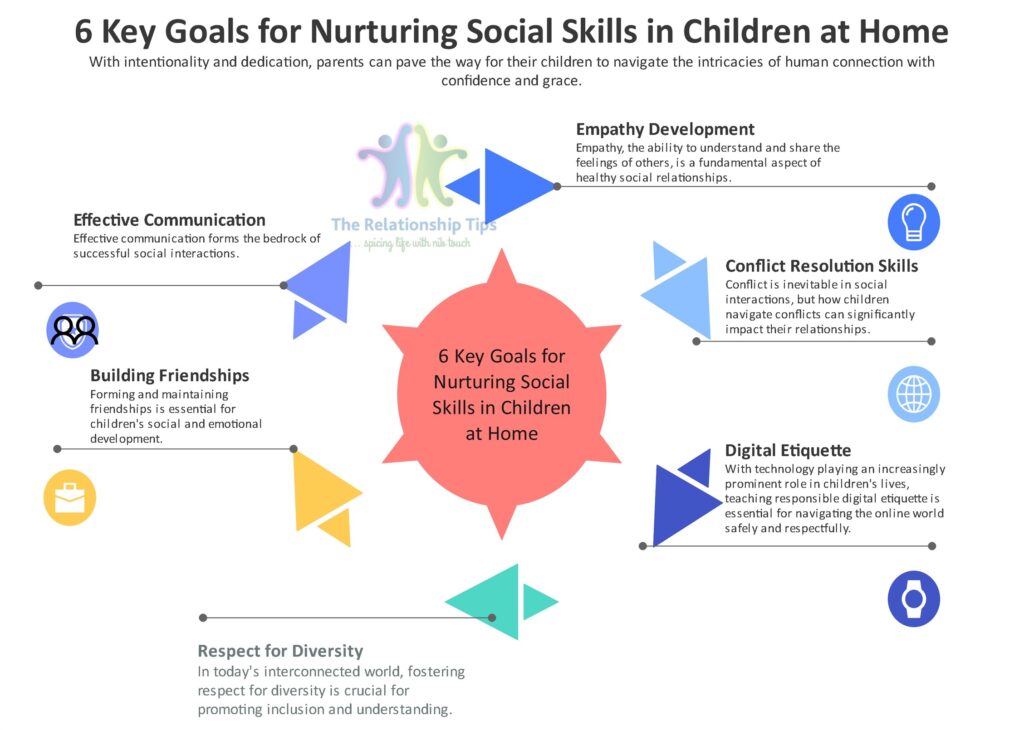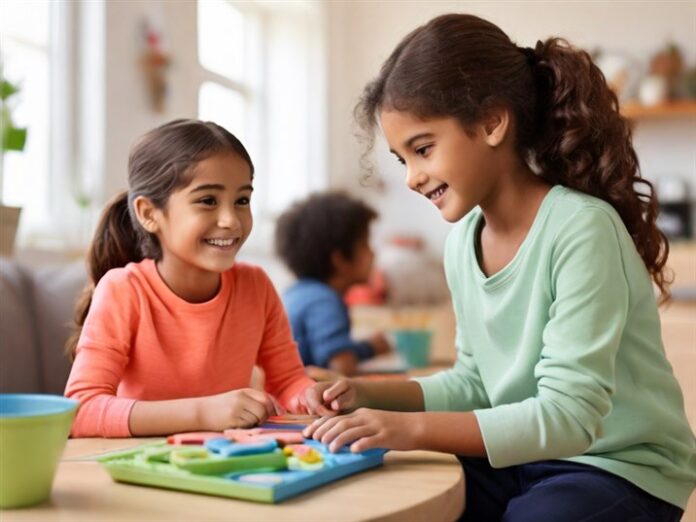In the bustling landscape of modern society, where digital screens often mediate our interactions, the significance of cultivating strong social skills in children cannot be overstated. These skills are not merely niceties but the very fabric that binds individuals to their communities, propelling them towards success and fulfillment. While schools and extracurricular activities play pivotal roles, the home stands as the primary crucible for nurturing these essential attributes.
Within its comforting embrace, parents wield profound influence in shaping the social aptitude of their children. This comprehensive guide embarks on a journey through six key goals for fostering social skills within the nurturing confines of home, illuminating pathways towards effective communication, empathy development, conflict resolution, friendship building, respect for diversity, and responsible digital citizenship. With intentionality and dedication, parents can pave the way for their children to navigate the intricacies of human connection with confidence and grace.
In This Article
- 1 6 Key Goals for Nurturing Social Skills in Children at Home
- 1.1 1. Effective Communication
- 1.2 2. Empathy Development
- 1.3 3. Conflict Resolution Skills
- 1.4 4. Building Friendships
- 1.5 5. Respect for Diversity
- 1.6 6. Digital Etiquette
- 1.7 Infographic: 6 Key Goals for Nurturing Social Skills in Children at Home
- 1.8 Frequently Asked Questions About Nurturing Social Skills in Children at Home
- 2 How can I encourage my child to develop better communication skills at home?
- 3 What are some effective strategies for teaching conflict resolution skills to children?
- 4 How can I support my child in building friendships and social connections?
- 5 What are some practical ways to teach my child about respecting diversity and inclusivity?
6 Key Goals for Nurturing Social Skills in Children at Home
1. Effective Communication
Effective communication forms the bedrock of successful social interactions. At home, parents can serve as role models by practicing active listening, maintaining open dialogue, and providing clear instructions. Simple practices such as family meetings, where everyone has an opportunity to share their thoughts and feelings, can foster an environment conducive to effective communication. Additionally, encouraging children to express themselves through art, journaling, or storytelling nurtures their ability to articulate their thoughts and emotions.
2. Empathy Development
Empathy, the ability to understand and share the feelings of others, is a fundamental aspect of healthy social relationships. Parents can cultivate empathy in children by teaching them to recognize and validate emotions, both their own and those of others. Engaging in activities that promote empathy, such as volunteering as a family or participating in community service projects, provides children with opportunities to develop a deeper understanding of others’ perspectives. Additionally, discussing characters’ emotions in books or movies and exploring real-life scenarios helps children practice empathy in various contexts.
3. Conflict Resolution Skills
Conflict is inevitable in social interactions, but how children navigate conflicts can significantly impact their relationships. Parents can teach conflict resolution skills by modeling positive conflict management strategies and providing guidance when conflicts arise. Encouraging children to use “I” statements to express their feelings, actively listen to others’ perspectives, and brainstorm mutually beneficial solutions empowers them to resolve conflicts constructively. Role-playing scenarios or using books and videos to illustrate conflict resolution techniques can further reinforce these skills.
4. Building Friendships
Forming and maintaining friendships is essential for children’s social and emotional development. Parents can support their children in building friendships by creating opportunities for social interaction, such as hosting playdates or enrolling them in extracurricular activities where they can meet peers with similar interests. Additionally, teaching children social skills like introducing themselves, joining group activities, and initiating conversations equips them with the tools to establish meaningful connections. Encouraging empathy and inclusivity in their interactions with others helps children foster strong and lasting friendships.
5. Respect for Diversity
In today’s interconnected world, fostering respect for diversity is crucial for promoting inclusion and understanding. Parents can expose children to diverse cultures, traditions, and perspectives through multicultural books, documentaries, and cultural celebrations. Encouraging discussions about cultural differences and similarities helps children develop empathy and appreciation for diversity. Additionally, modeling inclusive behaviors and addressing stereotypes or biases when they arise reinforces the value of respecting individuals from all backgrounds.
6. Digital Etiquette

With technology playing an increasingly prominent role in children’s lives, teaching responsible digital etiquette is essential for navigating the online world safely and respectfully. Parents can establish clear rules and boundaries around screen time, internet usage, and online interactions. Teaching children about online safety, including the importance of privacy settings and avoiding sharing personal information, helps protect them from potential risks. Modeling positive online behavior and emphasizing the importance of treating others with kindness and respect, both online and offline, sets a positive example for children to follow.
Infographic: 6 Key Goals for Nurturing Social Skills in Children at Home

Frequently Asked Questions About Nurturing Social Skills in Children at Home
How can I encourage my child to develop better communication skills at home?
Encouraging your child to develop better communication skills at home can start with simple practices like actively listening to them, providing opportunities for open dialogue, and modeling good communication habits yourself. Engage in conversations during meal times, ask open-ended questions about their day, and encourage them to express their thoughts and feelings in a safe and supportive environment. Additionally, reading books together and discussing the characters’ emotions can help expand their vocabulary and understanding of communication.
What are some effective strategies for teaching conflict resolution skills to children?
Teaching conflict resolution skills to children involves modeling positive behaviors, such as active listening, empathy, and compromise. Encourage your child to express their feelings calmly and respectfully, and help them understand the perspectives of others involved in the conflict. Practice role-playing scenarios where they can brainstorm solutions together and learn to negotiate mutually beneficial outcomes. Emphasize the importance of finding win-win solutions and reinforce positive behaviors when conflicts are resolved peacefully.
Supporting your child in building friendships and social connections involves creating opportunities for social interaction, such as hosting playdates, enrolling them in extracurricular activities, and encouraging participation in group settings where they can meet peers with similar interests. Teach your child social skills like introducing themselves, joining group activities, and showing interest in others’ perspectives. Foster empathy and inclusivity in their interactions by encouraging them to be kind and considerate towards others.
What are some practical ways to teach my child about respecting diversity and inclusivity?
Teaching your child about respecting diversity and inclusivity can start with exposing them to diverse cultures, traditions, and perspectives through books, movies, and cultural events. Engage in discussions about cultural differences and similarities, and encourage empathy and understanding towards individuals from different backgrounds. Model inclusive behaviors and address stereotypes or biases when they arise, emphasizing the value of respecting and celebrating diversity in all its forms.
Conclusion
As we conclude this exploration of nurturing social skills in children within the home environment, it’s evident that the journey towards social competence is multifaceted and dynamic. We’ve traversed through six key goals, each serving as a beacon guiding parents in fostering an environment where their children can thrive socially and emotionally.
Effective communication, empathy development, conflict resolution, friendship building, respect for diversity, and responsible digital citizenship are not isolated endeavors but interconnected threads weaving the fabric of a child’s social development. By embracing these goals with intentionality and consistency, parents can create a nurturing haven where their children learn to navigate the complexities of human interaction with resilience and compassion.
However, our journey does not end here; it merely marks a beginning. We invite you, our readers, to embark on this journey alongside us. Share your thoughts, experiences, and insights in the comments below. Let us engage in meaningful dialogue, exchanging ideas and strategies for nurturing social skills in children. Together, we can empower the next generation to forge meaningful connections, foster inclusive communities, and navigate the ever-evolving landscape of human interaction with grace and empathy.





